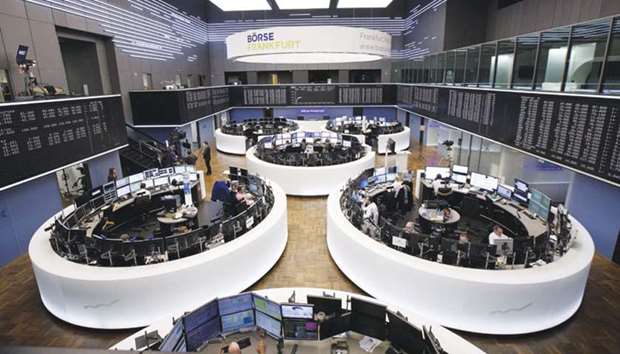Stock markets on both sides of the Atlantic suffered a sharp decline yesterday as volatility continued to dog global equities trading.
Key European markets were well in the red, with Frankfurt down by 3% just before the closing bell, while Wall Street rapidly extended early losses in New York action and analysts forecast more price swings.
“US stocks are extending a recent pullback with volatility remaining elevated in the wake of yesterday’s whipsaw session,” brokers Charles Schwab said.
The British pound took flight after the Bank of England warned that the pace of interest rate rises could accelerate.
London’s benchmark FTSE 100 index went deeper into loss following the announcement, as a stronger pound tends to penalise multinationals with substantial income from abroad.
In its statement, the Bank said that that borrowing costs could rise sooner than expected “in order to return inflation suitably to target”. But Lukman Otunuga at FXTM said that political uncertainty, especially around Brexit, could throw a spanner in the British central bank’s works, hampering an orderly rate tightening strategy.
Either way, the Bank’s more aggressive stance adds to the perception that the world’s key central banks are putting the squeeze on easy money, with the Federal Reserve also expected to raise rates and the ECB seeming to look for an early opportunity to phase out massive bond-buying.
In the eurozone, Paris and Frankfurt also closed dramatically lower — although Frankfurt managed to come off its worst levels — after Wall Street’s downturn drove them deeper and deeper into the red throughout the afternoon.
In Switzerland, Swiss Re shares were up more than four% after the reinsurance giant confirmed it was in talks to sell a minority stake in the company to Japan’s SoftBank.
London’s FTSE 100 closed 1.5% down at 7,170.69 points, Frankfurt’s DAX 30 ended 2.6% down at 12,260.29 points, Paris’ CAC 40 finished 1.0% down at 5,151,68 points, while the EURO STOXX 50 shed 2.3% at 3,376.20 points.
In the US, Twitter shares soared after the social network posted its first quarterly profit, having lagged fast-growing rivals for years.
After a long run of almost uninterrupted gains for world equity markets fuelled by cheap money and optimism about the economy, traders are navigating turbulent waters as central banks — led by the Federal Reserve — look to lift borrowing costs.
Last Friday’s strong US jobs and wage growth data, coupled with rising yields on bonds, brought an end to the record-setting global rally, sending Wall Street spiralling down before slamming world markets this week.
Oil prices extended Wednesday’s sharp sell-off on concerns about increasing US production, offsetting an output cap by Opec and Russia.

Traders monitor financial data inside the Frankfurt Stock Exchange. The DAX 30 closed 2.6% down at 12,260.29 points yesterday.
